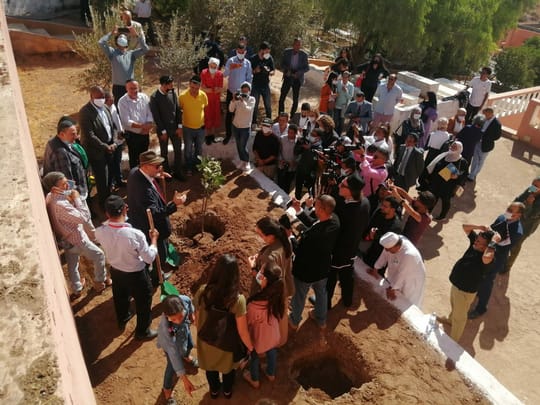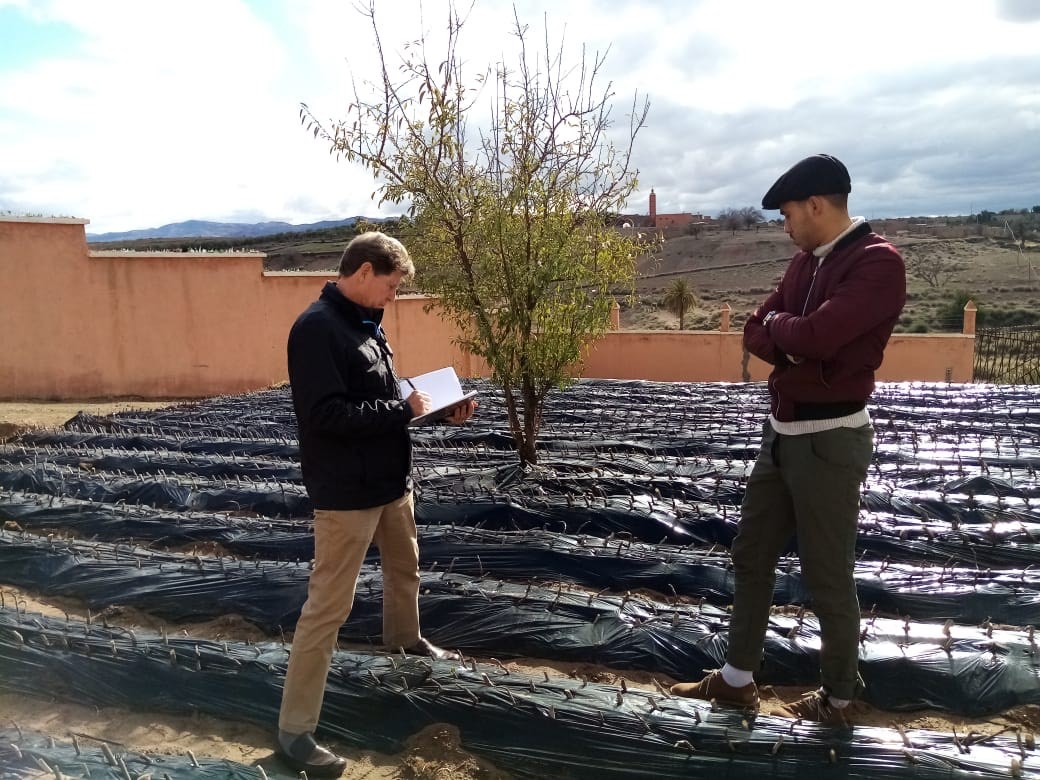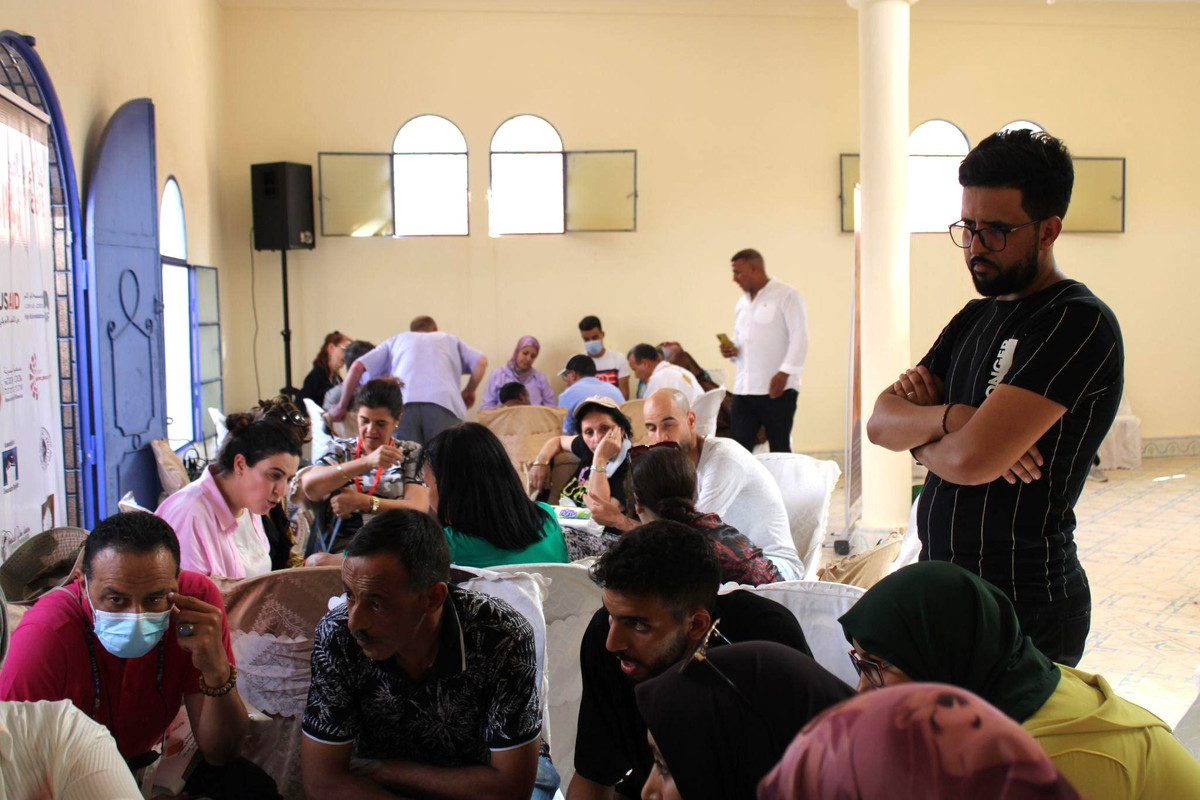Mutually Enhancing USAID Programs Implemented by HAF in Morocco: Farmer-to-Farmer and Dakira

In the Tameslouht municipality of the Al Haouz province, sustainable development and cultural activities are merging, catalyzed by the implementation of HAF’s Dakira and Farmer-to-Farmer (F2F) programs. The enduring efforts of these two USAID programs are in place at the Akrich Nursery, located near the sacred burial ground of the Jewish saint, Rabbi Raphael Cohen. HAF provides the nursery land in-kind, partnering with local farmers and the Moroccan Jewish Community who help maintain the nursery and benefit from the trees.
The USAID Dakira program aims to strengthen inter-religious and inter-ethnic solidarity through community efforts that preserve Morocco’s multicultural heritage. The program seeks to develop partnerships and initiate a participatory approach to the educational preservation of Morocco’s multicultural history. At the heart of its mission, Dakira acknowledges the historical solidarity between the Jewish, Moroccan, and Christian peoples and aims to strengthen the transmission of Morocco’s multicultural past into future community planning in all different sectors. The USAID F2F program promotes sustainable economic growth, food security, and agricultural development throughout Morocco. Volunteer technical assistance and collaboration between U.S. farmers, agribusiness experts, cooperatives, and universities help neighboring regions improve productivity, access new markets, and conserve environmental and natural resources. The missions of Dakira and F2F come together through projects such as the Akrich Nursery which harness cultural exploration for sustainable development and empowerment.
Through the Dakira program in Akrich, HAF hosts interfaith dialogues among international and Moroccan academic and civil groups on matters of Jewish and Muslim identities, Moroccan cultural heritage, reconciliation, and shared development.
Through the F2F program, U.S. and Moroccan experts and volunteers work within the nearby tree nursery, enhancing an efficient irrigation design and technical training of the nursery’s caretakers. These joint interactive programs operate beside one another; one side holds a fruit tree nursery that will bear produce for years, and the other side holds a sacred space that envelopes hearts and forges emotional bonds through social unity

From left to right: William S. Nichols, a F2F volunteer, and Errachid Montassir, F2F Country Manager, at the Akrich interfaith tree nursery. November 2, 2020. | 
Moroccan Muslim and Jewish participants taking part in an identity sharing and common heritage preservation workshop in Akrich, as part of the Experience Dakira conference. June 9, 2022. |
Vitally, integrated cultural and development processes have continued to unfold beyond the nursery. Through a local intercultural event, several women from the nearby Achbarou village were inspired to further their personal development and attend a HAF Imagine empowerment workshop. Through this integration of empowerment into the sustainable development process, they created the Achbarou Women’s Carpet-Making Cooperative in 2021. Their carpets are produced from the wool of locally-raised sheep, colored naturally by organic plants, woven with designs that capture the Muslim-Jewish history and heritage of solidarity in their community, and sold to visitors of the Akrich cemetery and nursery.
HAF is now partnering with Yves Saint Laurent Fashion (YSLF) to pave a half-kilometer road between Akrich and Achbarou. With the road in place, pilgrims who visit the burial place of Rabbi Raphael Cohen and visitors of the nursery can comfortably travel to the women’s cooperative. YSLF is also financing clean drinking water infrastructure and delivery in Achbarou.
Recently, the F2F team collected data and information alongside cooperative members through a community participatory meeting. Their scope of work was developed based on the cooperative’s priorities of implementing viable marketing strategies. Currently, the cooperative only sells their carpets locally and they wish to develop a presence on social media platforms.
In March 2023, Moroccan and American Volunteers focused on a new F2F assignment to regionally and internationally raise the profile of the cooperative to increase the customer base and generate additional income. The assignment provided cooperative members with training on marketing methods and acquiring product market information to better position their business and branding. Funded by the EU and implemented by HAF, members of 40 rural women’s cooperatives attend the bi-weekly literacy classes. In the past six months, this has not only built the essential skills needed for this new phase of growth but also strengthened the confidence necessary to embrace ever-increasing opportunities.
The USAID, F2F, and Dakira programs have expanded opportunities for rural women, creating a genuine transformation within Moroccan communities. The progress in Akrich and Achbarou illuminates a larger lesson: active cultural exploration and the harnessing of the multiplicity of identity form a basis for sustainable development and empowerment.
—
This article was completed with the support of the United States Agency for International Development (USAID), and the High Atlas Foundation is solely responsible for its content, which does not necessarily reflect the views of USAID or the Government of the United States.